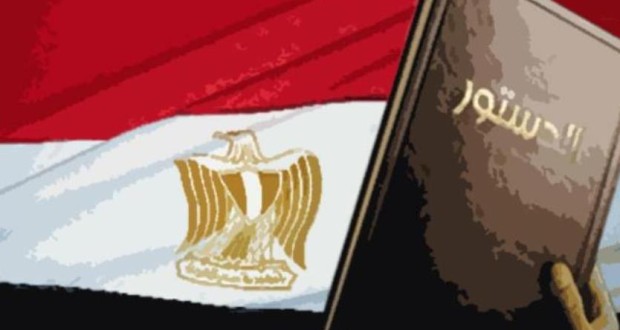By Zaneta Sedilekova
2nd August 2014, Human Rights and Conflict Resolution, Issue 3, No. 3.
A Year After the Overthrow of the Morsi Government
June 2013 saw the second turnover in the Egyptian democratic transition when millions of people gathered on the streets of Cairo to demand an immediate resignation of the first democratically elected Egyptian president, Mohamed Morsi.[1] Morsi’s one year tenure was marked by increasing authoritarianism and islamisation, which were both reflected in the draft constitution introduced by the Morsi Government in November 2013 (the 2013 constitution).[2] The unrest was resolved by the Egyptian military, which ousted Morsi after he rejected to meet their 48-hour ultimatum, demanding that he stepped down and restored political order in the country.[3] Adly Mansour, the head of the Constitutional Court, temporarily replaced Morsi in his office while the draft constitution was suspended in order to meet the protesters’ demands.[4] A year after the protests broke out it is clear that the democratic transition of Egypt has been launched, but is yet to be accomplished.
The Egyptian Constitution
The radicalised 2013 constitution was one of the main triggers that brought Egyptians back to the streets in June 2013. The document proclaimed Islam to be not only the main religion of the state, but also the fundamental source of law. The new Constitution of The Arab Republic of Egypt was adopted on January 18, 2014 (the 2014 Constitution) with a view to neutralising the radical provisions of the 2013 constitution. Indeed, the role of religion and the military, and the position of women have all received major attention from the Egyptian fifty-member panel of drafters.
1.1. Religion
In relation to religion, both constitutions state largely in the same terms that Islam is the religion of the State and, consequently, the State’s legislation is to be based mainly on the principles of Sharia.[5] However, while Article 219 of the 2013 constitution introduced the principle of a strict interpretation of Islamic Sharia, in nearly all law-related matters such as evidence, the rules of jurisprudence and foundational rules, this Article cannot be found in the 2014 Constitution. Instead, the question of the interpretation of Sharia was moved into the preamble, thus a non-binding introduction to the 2014 Constitution. This alteration to the controversial 2013 draft constitution may have positive implications for the judicial system in a long-term perspective – indeed, the preamble requires only the Supreme Constitutional Court to consider Islamic Sharia as the relevant source of interpretation in its rulings.
1.2. The Military
On the other hand, the 2014 Constitution can be also regarded as the reaffirmation of the strong position of the military in the Egyptian state. Article 234 which could not be found in the 2013 constitution makes the validity of the appointment of the defence minister conditional upon the approval of the Supreme Council of the Armed Forces. It is undeniable that this link between the office of the defence minister and the military institution may potentially endanger the independence of the former’s decision-making. The drafters of the 2014 Constitution were apparently well aware of this, and went as far as imposing a limitation on the validity of Article 234. Article 234 limits its own validity to two full presidential terms, thus eight years in total, starting from the date of the adoption of the Constitution. In the absence of any clarification as to whether or not the appointment procedure will require military approval, the office of the defence minister may be expected to become fully independent of any influence from the ranks of the military, once two full presidential terms have passed. However, the reasons for the introduction of Article 234 as well as its limitations are fairly understandable. The Egyptian army has always had a prominent position in the shaping of the Egyptian politics and history. It is thus hard to conceive a constitution divesting the former giant of its influence in political matters – indeed such immediate exclusion of the military from the political arena might have caused further interruption of the fragile stability that Egypt endeavoured to restore after the June protests. Article 234 should be seen as a provision which has been designed to facilitate the democratic transition of Egypt from a military-led state to one fully independent of the military.
1.3.Position of women
The preamble to the 2014 Constitution states that Egypt will abide by its international obligations under the Universal Declaration of Human Rights. As a result, a number of articles that were absent from the 2013 constitution are now laid down in the 2014 Constitution, offering more protection to women. Article 11 expressly stipulates that the Egyptian state has an obligation to ensure the achievement of equality between men and women in all their civil, political, economic, social, as well as cultural rights. In comparison, women’s rights were not mentioned in the text of 2013 constitution at all. The existence of the female part of the Egyptian population was acknowledged merely in the preamble to the 2013 constitution which called women the sisters of the men and mothers of the society without any reference as to what rights may stem from this title. In addition, the 2013 constitution did not introduce the equality principle. Article 11 of the 2014 Constitution goes even further and imposes an obligation on the Egyptian state to ensure an adequate representation of women in parliament, senior management positions as well as judiciary. Finally, the state has committed itself to protect women against all forms of violence and to enable them to find a workable balance between their work-related duties and family commitments.
The State’s transition
In a state’s transition towards democracy, fair delivery of justice upon the opponents of the new regime and those titled as such is one of the most important aspects of a new democratic order. After his fall in June 2013, the former president Morsi was charged with crimes he allegedly committed in 2011 – 2013. The charges against him included murder of a prison officer committed while escaping from detention during the 2011 uprising (against Horsi Mubarak), the responsibility for the death of protesters in December 2012, the conspiracy to commit terrorist acts, fraud and offending against the judiciary.[6] Many members of the Muslim Brotherhood, an Islamist organisation associated with Morsi, were also charged with the murder of the police officer in 2011 uprising.
The criminal courts thus took the initiative in redressing the harm committed in Egypt over the course of the last four years. Article 10 of the Universal Declaration of Human Rights, which Egypt has declared to respect, guarantees fair and public hearing by an independent and impartial tribunal to every person accused of a crime. However, it is disputable whether Morsi’s trial and the trial of Muslim Brotherhood members adhered to Article 10 standards. For instance, Morsi was confined to the sound-proof glass case in an Egyptian courtroom in January 2014. The Court claimed that such measure was implemented in order to prevent further misconduct of the former president and his continuous refusal to recognise the authority of the Court.[7] Nevertheless, the measure substantially impaired the level of Morsi’s involvement in the court proceedings and as such may be at variance with the fair trial standards required under Article 10 of the Universal Declaration of Human Rights. The trial of Morsi’s supporters were also marked by numerous shortcomings – in the first trials the judge delivered 528 death sentences without reviewing the evidence and allowing the defence lawyers to cross-examine the witnesses.[8] Not mentioning other flaws in the Egyptian criminal justice system, the delivery of the death penalty itself is in the breach of the basic human right not to be subjected to the inhuman or degrading punishment which the death penalty indisputably amounts to.
Finally, one should not forget that the former president Morsi had a number of supporters, many of whom gathered in the Cairo district of Nasr City to show support for their president at the same time Tahrir Square was occupied by his opponents in July 2013. Many of Morsi’s supporters were reported to have been killed by the security forces in their attempts to break the pro-Morsi rally, yet no official casualties have been released.[9] However, every democratic transition entails the delivery of justice upon all those who harmed people in the previous regime regardless of whether or not they had won the conflict. States in the transitional phase find it notoriously difficult to acknowledge that their supporters as much as their opponents perpetrated crimes under previous regime and in subsequent turmoil.
Nevertheless, without such an acknowledgement, the shift towards democracy that the new 2014 Egyptian Constitution has undeniably contributed to may be frustrated by the refusal to deliver justice objectively upon all those whose crimes cut short the lives or infringed upon the rights of Egyptian men and women and played a part in the destabilisation of the country as such. The enhancements introduced in the 2014 Egyptian Constitution concerning the role of religion, the influence of the military and the position of women have paved the way to the democratic transition of the country. The judicial system as such should also adhere to the democratic standards of the fair trial and objective justice in order for the transition to be fully launched. As the situation stands now, Egyptian transition towards democracy has commenced on paper, though its implementation in practice is yet to come.
[1] S. Fayed and Y. Saleh, “Millions flood Egypt’s streets to demand Mursi quit” (30 June 2013) The Reuters, http://www.reuters.com/article/2013/06/30/us-egypt-protests-idUSBRE95Q0NO20130630 Last accessed [27.7.2014] [2] “Morsi issues new constitutional declaration” (22 November 2013) Egypt Independent, http://www.egyptindependent.com/news/morsy-issues-new-constitutional-declaration Last accessed [27.7.2014] [3] “Egyptian military gives 48 hour ultimatum to Brotherhood, political forces” (1 July 2013) Al-Ahram Online, http://english.ahram.org.eg/News/75414.aspx Last accessed [27.7.2014] [4] “Egypt crisis: Army ousts President Mohammed Morsi” (3 July 2013) BBC News Middle East, http://www.bbc.com/news/world-middle-east-23173794 Last accessed [27.7.2014] [5] 2013 Draft Constitution, Article 2; Constitution of The Arab Republic of Egypt 2014, Article 2 [6] “What’s become of Egypt’s Morsi?” (24 March 2014) BBC News Middle East, http://www.bbc.com/news/world-middle-east-24772806 Last accessed [27.7.2014] [7]“What’s become of Egypt’s Morsi?” (24 March 2014) BBC News Middle East, http://www.bbc.com/news/world-middle-east-24772806 Last accessed [27.7.2014] [8] “Egypt: 683 new death sentences in Muslim Brotherhood trial shows ‘complete contempt’ for justice” (28 April 2014) Amnesty International UK http://www.amnesty.org.uk/press-releases/egypt-683-new-death-sentences-muslim-brotherhood-trial-shows-complete-contempt Last accessed [27.7.2014] [9]“Scores killed in clashes at pro-Morsi rally” (27 July 2013) Al Jazeera English, http://www.aljazeera.com/news/middleeast/2013/07/201372774215454742.html Last accessed [30.7.2014]Zaneta Sedilekova is contactable at: zaneta.sedilekova@hscentre.org
Please cite this article as:
Sedilekova, Z. (2014) ‘A year after the overthrow of Morsi’s government – where does Egypt stand in its transition towards democracy?’ Human Security Centre, Human Rights and Conflict Resolution, Issue 3, No. 3.
 Human Security Centre Human Rights and International Security Research
Human Security Centre Human Rights and International Security Research




